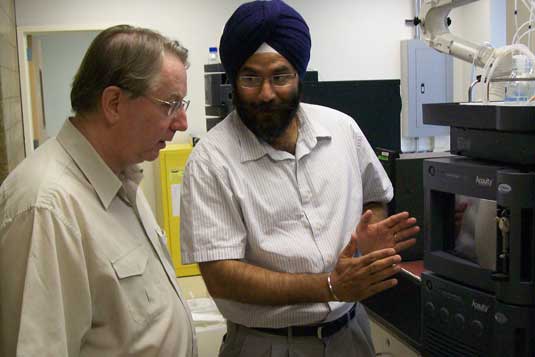WET Center partners with N. Ireland center on groundwater remediation
 Photo Courtesy: Preston Moretz / Temple University
Rominder Suri (right), director of the Water and Environmental Technology Center in the College of Engineering, gives a center tour to Mike Larkin, chair of the Queen's University Environmental Science and Technology Research Center in Belfast, N. Ireland, during a recent visit. The two centers have recently entered an international research collaboration to develop applications and processes for the treatment of contaminated groundwater. Larkin also met with College of Engineering Dean Keya Sadeghipour and offered a seminar to Temple faculty and students.
|
|
|
The Water and Environmental Technology (WET) Center in Temple’s College of Engineering has entered into an international research collaboration with the Queen's University Environmental Science and Technology Research (QUESTOR) Center in Belfast, Northern Ireland, to develop applications and processes for treating contaminated groundwater. The collaboration, funded by approximately $400,000 from the National Science Foundation and Invest Northern Ireland through the European Commission, will bring together the WET Center’s strength in physical/chemical processes and the QUESTOR Center’s strength in microbiological processes to develop unique methods of degrading emerging contaminants — unregulated micropollutants found in the environment that can harm humans. “The QUESTOR Center is one of the leading organizations in the world in that kind of work in microbiology, and at the WET Center, we’re working on physical and chemical processes such as using ozone and ultrasound for the degradation of many kinds of emerging contaminants,” said Rominder Suri, director of the WET Center and associate professor of civil and environmental engineering at Temple. “We believe this collaboration will lead to developing a treatment scheme that will efficiently degrade these contaminants combining both a physical and microbiological approach.” Mike Larkin, chair of the QUESTOR Center and professor of microbiology at Queens University, said that the two centers are very similar and that the National Science Foundation is very keen on international links, so it made sense for the collaboration. And there are other benefits, he said. “Where we can identify problems and use multi-disciplinary approaches to solve those problems, such as linking process engineering here at Temple and microbiological at Queens to develop novel approaches for treating contaminated groundwater, then we are encouraged to do so by our industry partners,” he said. |
|